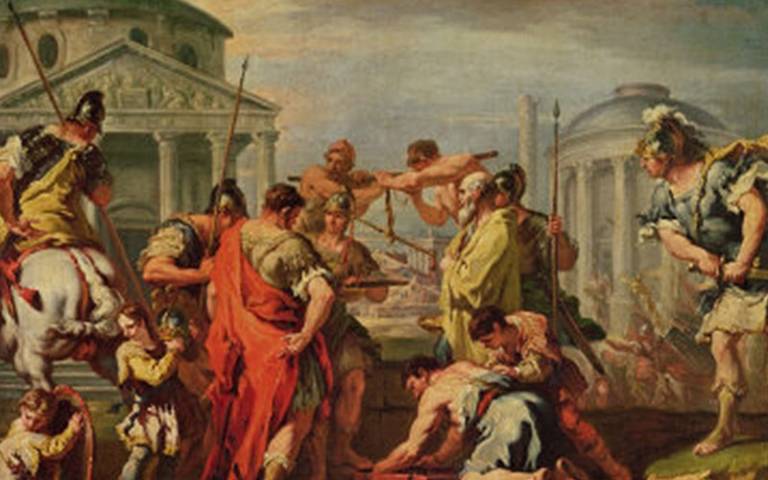Third time lucky? The “history” of a legal dodge and Roman republican historiography
30 November 2018, 5:00 pm–7:00 pm

Tony Thomas Seminars in Roman Law Series: 2018-19 JAC (Tony) Thomas was Professor of Roman Law at UCL from 1965 to 1981. His famously inspiring lectures and influential research established a tradition of Roman law scholarship in the Faculty of Laws, which the Tony Thomas Seminars in Roman Law both continue and celebrate.
Event Information
Open to
- All
Organiser
-
UCL Laws
Location
-
LG16 Seminar RoomBentham HouseUCL LawsLondonWC1H 0EGUnited Kingdom
Speaker
Dr Ulrike Roth, School of History, Classics and Archaeology, University of Edinburgh
About the Lecture
When the Romans were attacked by the Gauls in 390 BC, and agreed to surrender, one of Rome’s greatest heroes – Marcus Furius Camillus – appeared just in time to stop the ransom exchange that the Romans had agreed with the Gauls – or so the story goes. Camillus challenged the ransom exchange on a constitutional basis, claiming that the agreement was invalid because it had been made by a magistrate of inferior status. A couple or three generations later, in 321 BC, the Romans were once more in a situation in which – according to their enemies (and Livy …) – they defaulted on an agreement. Livy makes the enemy leader exclaim that the Romans always ‘contrive to give the fraud some colour of legality’, citing specifically the situation in 390 BC (Livy 9.11.6-7):
Nunquamne causa defiet cur victi pacto non stetis? Obsides Porsinnae dedistis: furto eos subduxistis; auro civitatem a Gallis redemistis: inter accipiendum aurum caesi sunt; pacem nobiscum pepigistis, ut legiones vobis captas restitueremus: eam pacem inritam facitis. Et semper aliquam fraudi speciem iuris imponitis.
(Will you never, when you have been beaten, lack excuses for not holding to your convenants? You gave hostages to Porsinna – and withdrew them by a trick; You ransomed your City from the Gauls with gold – and cut them down as they were receiving the gold. You pledged us peace, on condition that we gave you back your captured legions – and you nullify the peace. And always you contrive to give the fraud some colour of legality.)
This paper first demonstrates the dependence of the constitutional aspect of Camillus' interference in the Romano-Gallic ransom exchange in 390 BC on this later event, in 321 BC, and – second – the dependence of both legal dodges on a much later event still – in 137 BC. In consequence, a terminus post quem for the invention of Camillus' 'legal armoury' of 136 BC is suggested. The question thus raised is why it was important to attach this legal armoury to this Roman hero in the late Republic - and a tentative answer is given. The paper makes a contribution to our understanding of changes in the Roman handling of international agreements in the second century BC, Livy's Ab urbe condita, and Roman historiography of the late Republic more broadly.
About the Speaker
Ulrike Roth is an Ancient Historian, specialising in the study of slavery, esp. Roman. She joined the School of History, Classics and Archaeology in Edinburgh in 2004. Before, she held posts in the University of Wales, Swansea and at King's College London, where she taught both Roman and Greek history. Dr Roth is a historian by training: her alma mater is the Johannes Gutenberg University in Mainz (Germany), whence she graduated in 1997 with a degree in History, Theology and Pedagogy (‘Staatsexamen’).
After graduating, Dr Roth taught German for three years at a sixth-form college in Sussex, ran her own restaurant, and completed a PhD in Ancient History in 2004 at the University of Nottingham on the role of the female slave in Roman agriculture. Dr Roth has continued to work on slavery, which remains the main focus of her research. She has held a number of academic and research management roles at Edinburgh, including REF2014 co-ordinator for Classics (Unit 31), and the headship of Classics, 2011-2015.
Between 2009 and 2015, Dr Roth has served on the Standing Committee of the Council of University Classical Departments. Since 2010, she has been the Honorary Secretary of the British Epigraphy Society. She has reviewed for a number of journals and publishers, including Classical Quarterly and Oxford University Press, and has peer-reviewed applications for various funding bodies, including the AHRC and the Leverhulme Trust. She has herself had twice funding from the British Academy for her research, and has recently been awarded a Leverhulme Trust Major Research Fellowship for her project on child slavery, tenable 2017-2020. Together with Prof. Paul du Plessis from the School of Law, she directs the Ancient Law in Context Research Network.
 Close
Close

